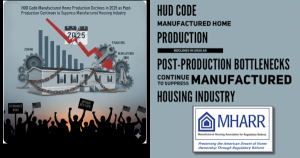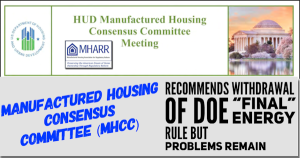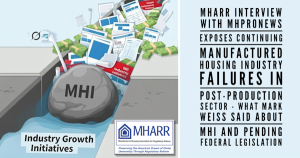[vc_row][vc_column][vc_column_text]Washington, D.C., February 6, 2018 – The Manufactured Housing Association for Regulatory Reform (MHARR) reports that according to official statistics compiled on behalf of the U.S. Department of Housing and Urban Development  (HUD), year-over-year manufactured housing industry production grew once again during December 2017. Just-released statistics indicate that HUD Code manufacturers produced 7,245 homes in December 2017, a 3.57% increase over the 6,995 HUD Code homes produced during December 2016. Cumulative industry production for 2017 thus totals 92,902 homes, a 14.5% increase over the 81,136 HUD Code homes produced in 2016.
(HUD), year-over-year manufactured housing industry production grew once again during December 2017. Just-released statistics indicate that HUD Code manufacturers produced 7,245 homes in December 2017, a 3.57% increase over the 6,995 HUD Code homes produced during December 2016. Cumulative industry production for 2017 thus totals 92,902 homes, a 14.5% increase over the 81,136 HUD Code homes produced in 2016.
Annual HUD Code industry production totals for the past ten years – from 2008 to 2017 – are thus:
- 2008 – 81,457 homes
- 2009 – 49,683 homes
- 2010 – 50,056 homes
- 2011 – 51,618 homes
- 2012 – 54,881 homes
- 2013 – 60,228 homes
- 2014 – 64,334 homes
- 2015 – 70,544 homes
- 2016 – 81,136 homes
- 2017 – 92,902 homes
A further analysis of the official industry statistics shows that the top ten shipment states from the beginning of the industry production rebound in August 2011 through December 2017 — with cumulative, monthly, current year (2017) and prior year (2016) shipments per category as indicated — are:[/vc_column_text][vc_table vc_table_theme=”classic”][align-center]State,Cumulative,[align-center]Current%20Month%20(Feb.%202017),[align-center]2017%20%20%20,[align-center]2016|[align-center]Texas,84%2C368%20%20homes,[align-center]1%2C941,[align-center]17%2C676,[align-center]12%2C747|[align-center]Louisiana,32%2C614%20homes,[align-center]410,[align-center]5%2C766,[align-center]7%2C774|[align-center]Florida,26%2C674%20%20homes,[align-center]387,[align-center]5%2C855,[align-center]5%2C933|[align-center]Alabama,20%2C711%20%20homes,[align-center]611,[align-center]6%2C046,[align-center]3%2C612|[align-center]N.C,18%2C410%20%20homes,[align-center]280,[align-center]3%2C835,[align-center]3%2C333|[align-center]Mississippi,17%2C165%20%20homes,[align-center]270,[align-center]3%2C665,[align-center]3%2C183|[align-center]California,16%2C654%20%20homes,[align-center]296,[align-center]3%2C681,[align-center]3%2C120|[align-center]Kentucky,15%2C227%20%20homes,[align-center]189,[align-center]2%2C807,[align-center]2%2C692|[align-center]Michigan,16%2C396%20%20homes,[align-center]379,[align-center]4%2C791,[align-center]3%2C866|[align-center]Tennessee,13%2C049%20%20homes,[align-center]240,[align-center]2%2C664,[align-center]2%2C282[/vc_table][vc_column_text]The latest information for December 2017 results in no changes to the cumulative top-ten list.
While the industry continues to expand following record-low annual production in 2009, it still has not recovered to historical norms, or to a level that would meet the growing national demand for affordable housing and home-ownership. One of the key factors underlying this phenomenon – excessive HUD regulation and the failure of the federal program to fully and properly implement key reforms of the Manufactured Housing Improvement Act of 2000, may be on the verge of changing under the leadership of Trump Administration appointees at HUD. Another crucial factor, however, the ongoing unavailability of affordable, market-competitive consumer financing, and particularly (and to a much larger degree) chattel financing, due to the totally inadequate implementation of the Duty to Serve Underserved Markets (DTS) mandate by Fannie Mae, Freddie Mac and the Federal Housing Finance Agency (FHFA), after ten years, continues unabated. Even worse, an effort appears to be underway by the industry’s largest corporate conglomerates to potentially divert DTS funding to a new proprietary “class” of manufactured homes that could have the market effect of re-relegating traditional, non-subsidized, affordable manufactured homes produced by smaller, independent manufacturers, back to the status of “trailers,” a position and market-image which the industry has fought to escape for decades.
MHARR has already analyzed and evaluated this major failure by Fannie Mae, Freddie Mac and FHFA, and is about to initiate a renewed effort to not only expose the relevant details of this failure, but also to seek effective remedial action.
The Manufactured Housing Association for Regulatory Reform is a Washington, D.C.-based national trade association representing the views and interests of independent producers of federally-regulated manufactured housing.[/vc_column_text][/vc_column][/vc_row]













